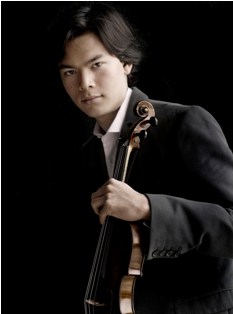
Jackiw, Remmereit Debut with the Cincinnati Symphony
Unlike James Bond’s martini, Music Hall should be “shaken
AND stirred.”

Considering the attendance at Friday morning’s Cincinnati Symphony concert in Music Hall, a decent number but scattered all over its 3,500 seats, it needs to be shaken a bit more, i.e. down-sized, or at least made adjustable.
Figuratively, Music Hall is often shaken and stirred. And so it was Friday, with different degrees
of success. Guest conductor Arild
Remmereit led a performance of Tchaikovsky’s Symphony No. 3 ("Polish") that was calculated
to “shake” up the hall and it did, perhaps too much so.

Violinist Stefan Jackiw showed how “stirring” is done in a luminous, perfectly focused performance of Max Bruch’s “Scottish Fantasy.”
Both artists were making their CSO debuts.
Just 24, Jackiw (pronounced jack-eev) is without doubt a star of the future. Born in Boston to a Korean mother and German-Lithuanian father, both physicists, he has been taking his time. Like Yo Yo Ma, he graduated from Harvard while honing his musical skills. Like few violinists who pass through Music Hall, Jackiw was able to speak in a whisper and still be heard, as in the slow, solemn beginning of the “Scottish Fantasy,” an evocation of the Celtic soul. Speaking of Celtic, the harp (played by Gillian Benet Sella) was placed at the front of the orchestra to enhance its important role.
Leaning forward toward the audience, his mop of dark hair practically covering his eyes, Jackiw engaged the work’s Scottish melodies in lush, melting tones. There was an exquisite duet with associate principal flutist Jasmine Choi in the first Allegro, and interaction with Remmereit and the CSO was close and sympathetic throughout. There were plenty of virtuosic moments, including some wonderful fiddling in multiple stops on the violin. Jackiw climbed high on the violin’s highest string in a dreamy moment before the end, where the music plunges into one last statement of a song attributed to the Scottish hero Robert the Bruce.
Tchaikovsky’s Third is called the "Polish" because of the tempo di polacca designation of the final movement (a polacca, or polonaise, is a Polish folk dance). It is the least played of his six numbered
symphonies and the only one in a major instead of a minor key. It was not premiered by the CSO until 1943 and its last Music Hall performance was in 1991, Jesus Lopez-Cobos conducting.
The primary reason for this may be that it is Tchaikovsky in a happy mood, classically in touch, and without the big romantic themes and distraught moments audiences know and love. Norwegian born Remmereit, 48, who led the 45-minute symphony entirely from memory, may have been trying to bridge that gap. Tall and blond, with an extroverted podium manner, he sought to build up a froth of excitement, often with super-fast tempos. Sometimes this did not jibe with the CSO players, who stumbled now and then and seemed to have to hold onto the rail.
This was most noticeable in the first movement, which he took at blistering speed, erasing some of the music’s nobility and grandeur. The lovely, waltz-like “Alla tedesca” that followed fared somewhat better. Remmereit, who has a very expressive left hand and sometimes “throws” beats at his players like a pitcher, showed his hand most clearly in the Andante elegiaco, the most overtly romantic of the five movements, where he built the strings to soaring intensity. There was fine work here by principal bassoonist William Winstead and principal hornist Elizabeth Freimuth.
The Scherzo, a nimble, almost Mendelssohnian movement with muted strings and tripping winds, was a bit heavy, but Remmereit projected much of the beauty Tchaikovsky built into it, such as the string arpeggios that transition back to the opening material and the distinctive trombone solos. He built the finale -- marked con fuoco, “with fire,” justifying an all-stops-pulled approach -- to a grand conclusion. Still the tempo was pushed and, on top of the preceding movements, it seemed a bit anti-climactic.
The concert opened with a fine performance of Sibelius’ popular and stirring “Finlandia,” inexplicably unheard on CSO Music Hall concerts since 1999.
Repeat is 8 p.m. tonight at Music Hall. Tickets (beginning at $10) at (513) 381-3300.
(first published in the Cincinnati Enquirer March 20, 2010)